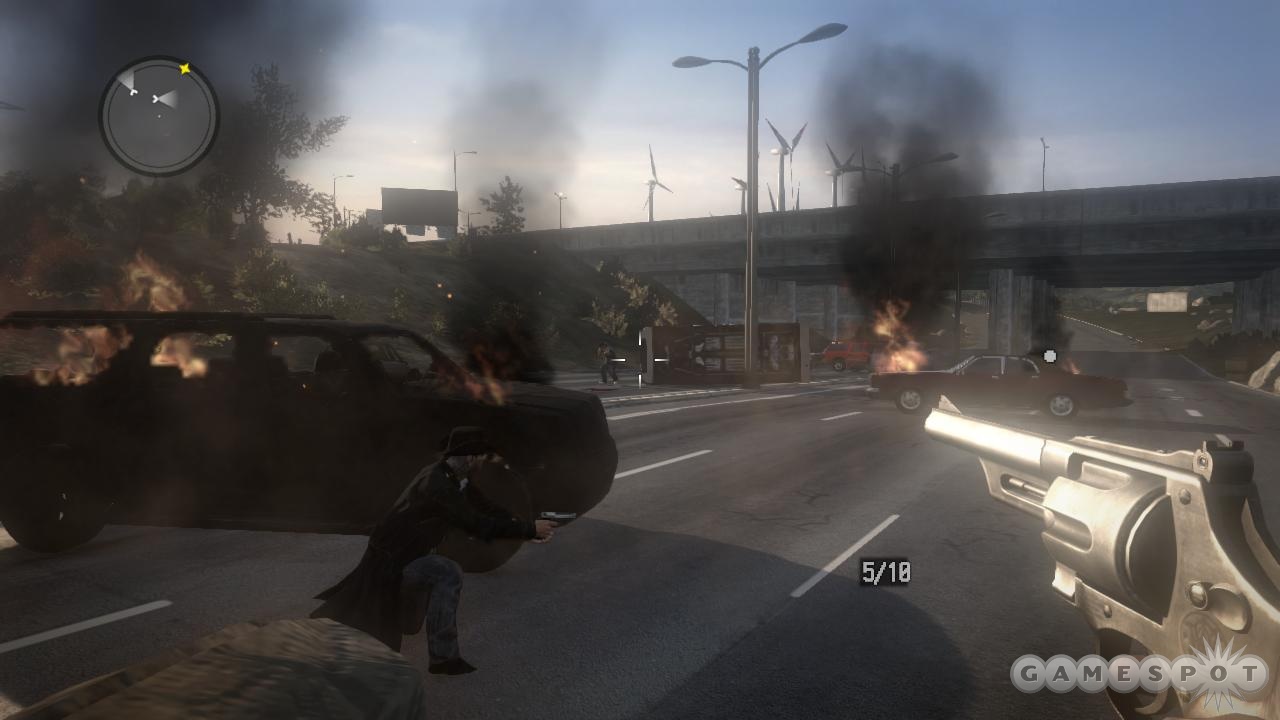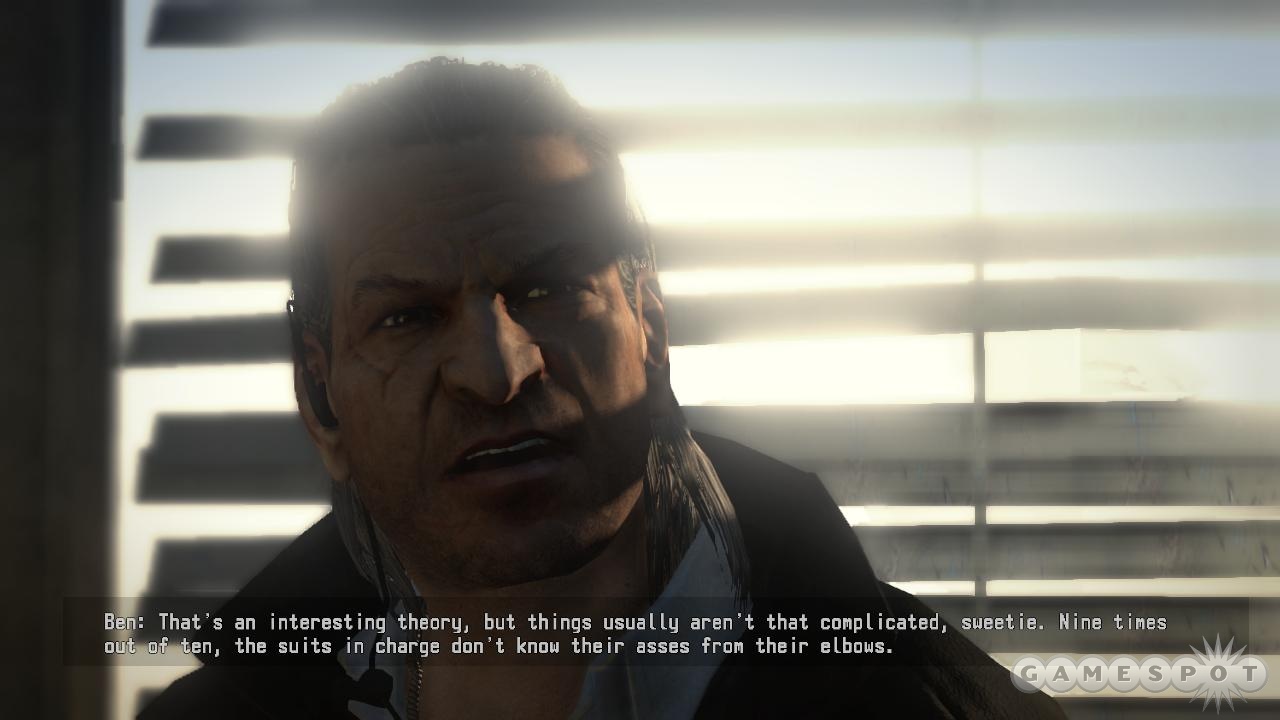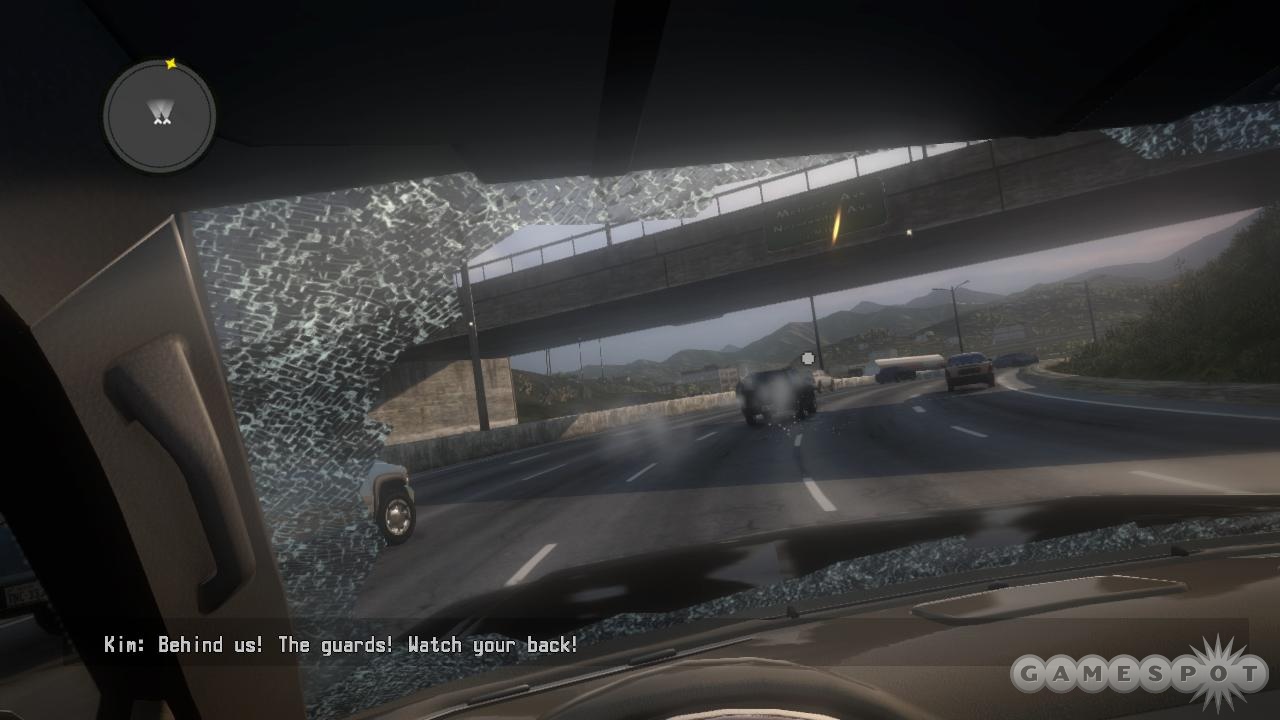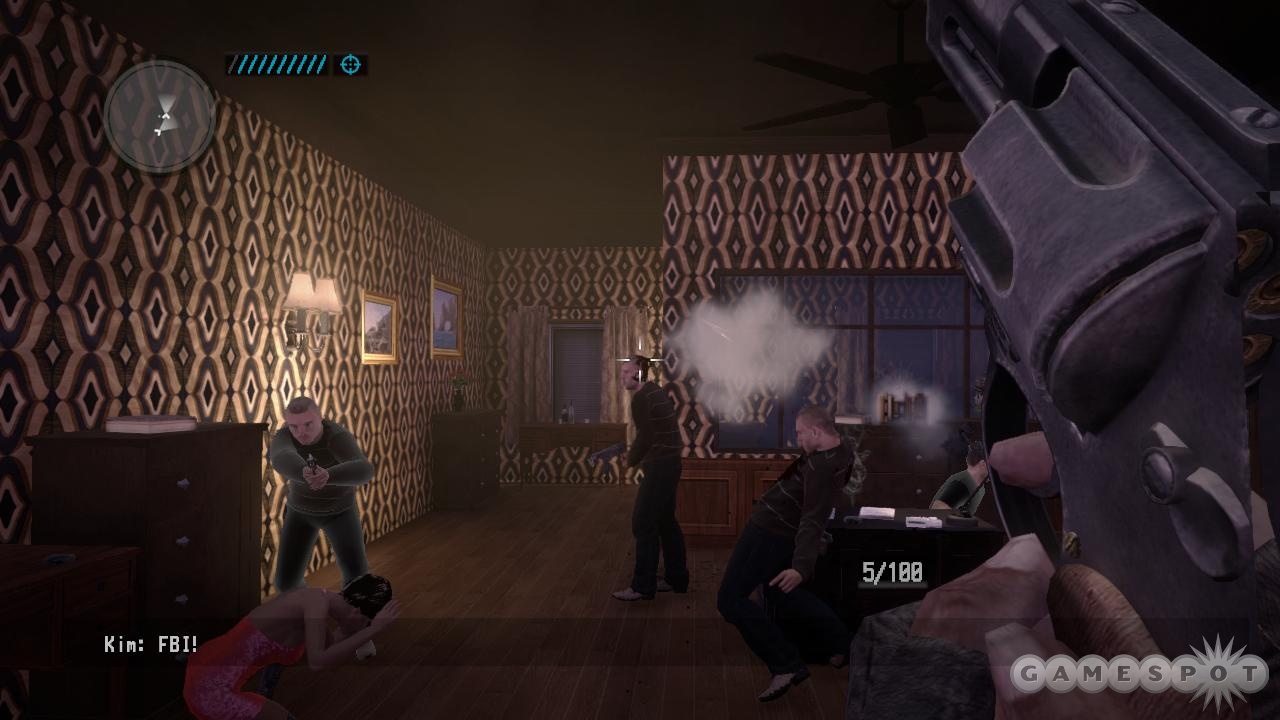It has been almost two months since Call of Juarez: The Cartel was released on consoles. In the time since, you may have hoped that developer Techland would have been busy fixing the problems that plagued those versions for the game's PC release. Instead, this first-person shooter is even more problematic than before. The bugs, the poor audio editing, the interruptions during combat scenarios: they're as inescapable as The Cartel's racial stereotypes and adoration of the F-word. Furthermore, a scant online community means that you may never see the best that The Cartel has to offer, though that doesn't mean you can't have fun with it. As one of three sleazy government agents, you thieve secret items hidden away in each level's nooks and crannies--and must do so without being caught by your curious comrades. It's an inspired notion in keeping with the innate distrust among these three slippery sorts. But what The Cartel needed wasn't inspiration--it was repair.
The Cartel also needed more likable leads and better dialogue, which isn't to say there isn't room for good antiheroes in game stories. (The original game's Reverend Ray is a shining example of an antihero done right.) But the three leads here--the LAPD's Ben, Kim with the FBI, and DEA agent Eddie--gush obscenities and sneer so often, you fear their faces may stay in that position permanently. There are a few attempts to deepen their personalities, such as a quiet scene in which Ben contemplates a taped message from an old friend. But most scenes involve a lot of yelling and racial stereotyping, with slimy gangsters calling each other "homes" and "ese" a lot, and the leads performing deeds so despicable that there's little to separate them from the goons they're fighting. Other cinematics are so dry as to lull you to sleep, such as an expository cutscene largely devoid of sound effects and music, in which government reps sit around a table and set up the game's premise. Audio difficulties also intrude. Characters speak over each other, and some scenes are so heavy with reverb they sound as if the actors were recorded in a public restroom. And it's hard to take a story seriously when the subtitles frequently don't match the recorded dialogue.
Both the boring and the obnoxious aspects come together in a scene in which the three partners bloody up a target in the median of a busy highway. When playing cooperatively, you and your buddies take turns delivering a violent punch or kick with a single key press--one after another after another. The scene goes on for so long you begin to feel sorry for the guy on the ground. Yet your character (and thus, the camera) stares at the ground instead of following the violent acts of your comrades. You remember the sight of the poor grass textures more than the violence your team visits upon this crook. It's an uncomfortable mix of aggression and monotony.

Nevertheless, uniting three untrustworthy agents from three different agencies is a worthy foundation, and The Cartel tries to make good on it by giving each of the three playable characters a unique point of view. The plot, in which this mismatched team attempts to disrupt a web of drug trafficking, is the same regardless of which character you play. But each character has a personal agenda. You and your companions receive phone calls from contacts, filling in story gaps and urging you to perform secret missions. When you play online with another player or two filling in for the AI, this narrative device adds an intriguing dimension that nicely parallels the escalating distrust among the team. When a teammate receives a call, you hear only his side of the conversation. And the cryptic one-sided dialogue means that you experience that distrust along with your character.
The theme of distrust carries over into those secret missions themselves. Secret missions may involve nabbing a cell phone or destroying a vehicle, and each level contains hidden objects that you, and only you, can collect. Your companions, meanwhile, have different duties to accomplish and different items to nab. The trick, however, is not getting caught. Should you thieve an item in eyeshot of a comrade, you don't get credit for taking it, though your buddy gets credit for catching you. Successfully accomplishing a task earns you experience, as does spotting a double-crossing partner. And earning experience helps you gain levels, which in turn gives you access to better guns at the start of each chapter. What a neat idea this is--not just because it cleverly links the story to the gameplay, but also because it gives cooperative play a competitive twist.

But like most of The Cartel's appealing concepts, secret missions suffer from execution errors. Updates come in the form of text messages and phone calls, at which point your pace slows and you must listen to the message or read the text. You might receive an update in the middle of one of the game's clumsy fistfights, or during a high-speed car chase. You can't hang up of your own accord; all you can do is hope your foe doesn't pummel you while you stupidly hold your phone up as if nothing unusual is going on. The secret missions' most pressing flaw, however, is that if you play alone, with the AI controlling your two companions, you miss out on much of the uniqueness. AI companions can interrupt your attempted thefts, and they never perform their own secret acts, so you are always the spied-upon, but never a spy. That's too bad, because if you don't have a regular buddy to play with, you will likely never experience The Cartel's most unique feature: it is almost impossible to find a co-op partner via the game's built-in matchmaking.
If you play alone, you also miss out on another of The Cartel's distinctive assets. While playing with others, you occasionally get the opportunity to complete challenges. Each player might receive a different challenge for any given sequence--perhaps to land a certain number of headshots or murder a specific number of thugs with melee attacks. Succeed, and you earn experience. But there's a slight wrinkle: when one player meets his goal, the other players immediately fail the challenge, so you have to work fast if you want that extra reward. Challenges add yet another competitive dimension to cooperative play, though they too come with annoyances. For instance, challenge opportunities (along with other objective-related messages) are announced with big, unsightly blocks of text that can obscure your view during a firefight. In fact, Call of Juarez: The Cartel is big on cluttering the screen with unnecessary interface elements. Every time you need to reload, the game prompts you with a big eyesore key prompt. Forgot how to skip cutscenes? Don't worry: the garish text in the corner of the screen is there to remind you. And all those prompts use the same out-of-place, ugly pixelated font used in the menus.
Of course, Call of Juarez: The Cartel is a first-person shooter. Therefore, you fire guns a lot, and the shooting model is smooth and entertaining. Many levels give you a good amount of breathing room, allowing you and your partners to flank and take advantage of the terrain. In Sequoia National Park, you might clamber to a boulder above and take potshots while your partners remain in the forest and occasionally crouch behind cover to regenerate health. Other shoot-outs occur on the decaying streets of Los Angeles, in Mexican ghost towns, and within drug trafficking tunnels. There are a good number of rifles, pistols, and submachine guns, and they feel as they should. The AK-47 serves as a nice fallback at medium range; revolvers have oomph. And if you peer down the iron sights of certain weapons long enough, your view zooms in a bit more, which is a good touch. There are some corridor shoot-outs, but The Cartel is not a corridor shooter. Thus, it's rare that a teammate--AI or human--wanders into your line of fire simply because there's nowhere else to go.
To mix up the shooting, The Cartel leans on its limited tricks a few too many times for comfort. One such trick is the slow-motion room entry, in which you and a teammate breach a door and get a few seconds to gun down baddies without fear. Another is the car chase scene. In each level, you can count on a driving sequence in which one player gets behind the wheel and the others lean out the windows and shoot at vans and escapees. This is fun when you play with buddies, because you can vary your roles. But with only a few exceptions, playing with only the AI means being forced behind the wheel while your companions exhibit their ineffectiveness. You could drive flawlessly but fail the mission, which is never fun. Other problems can also spoil the driving. In one mission, you must catch up to a fleeing felon, but the vague waypoint makes it hard to figure out where to go. You might fail over and over again because you leave the mission area, trying desperately to determine exactly what the game expects of you. Actually, this can happen in any number of places if you wander too far off the beaten path; a sincere attempt to flank a group of hooligans might inadvertently trigger a game-over screen, simply because you went somewhere the game didn't want you to go. As a rule, losing conditions are poorly communicated. Sometimes, a teammate gets the chance to revive you if you go down. Other times, it's an immediate game over. Can you run over a pedestrian during a car chase? That might be fine, or it might lead to unexpected failure.

The shooting is periodically strengthened by thoughtful atmospheric touches. Colorful graffiti scrawled on run-down walls stands in sharp relief against the evening LA skyline. As you trudge through the forest, dual waterfalls pour from the cliffs above while your fallen enemies stain the ground with blood. It's unfortunate that such sights are demeaned by the creaky engine that renders them. Vehicles and pedestrians pop into existence right in front of you. AI companions disappear from view and teleport to another location 50 feet ahead. Sunlight might shine into a room through a solid wall. These hitches are much more noticeable on the PC than on consoles due to the platform's higher resolutions. Furthermore, oversaturated lighting and an unattractive omnipresent blurriness make it difficult to pinpoint distant enemies. If you want to sharpen up the looks, you need to toy with your video card's software: The Cartel gives you precious few graphics settings to adjust. The game supports DirectX 11, but it looks so dated, you'd never notice the effects of that technology.
Just like the campaign, The Cartel's online competitive play has initial promise that never quite comes to fruition. You join a team of cops or criminals and fight the opposition, either in Team Deathmatch or in objective-based missions in which you must, for example, break into a warehouse and steal the drugs inside. The feature with promise in this case is the partner system. The game matches you up with another player to be your partner. You always know where your partner is, and when you spot an enemy, the game marks his location for your teammate. Stick together and you receive a bonus, such as doing extra damage. As good as these ideas are, multiplayer is still mundane. Flashbang grenades are thrown every which way, blinding you every few minutes, and opponents blend into the smeary visuals. And considering the low population just days after the game's release, you won't want to play The Cartel if sustained online competition is your primary goal.

Call of Juarez: The Cartel, like many other Ubisoft games, requires an Internet connection to start the game. This might not be an inconvenience to most players, but it's a consideration--though in this problematic first-person shooter, online digital rights management is hardly the greatest source of woe. This first-person shooter shows the signs of potential greatness. Few games combine the elements of cooperation and competition so ingeniously. There's nothing like being a dirty double-crosser--and getting away with it. It's invigorating to fulfill a challenge, yanking the experience points from under your comrades' noses and flaunting your shooting skills. The Cartel is worth playing if you have a buddy or two along for the ride, given that you can't count on finding random players to join. Otherwise, the potential is hard to see hiding behind all the glitches and obscenities.